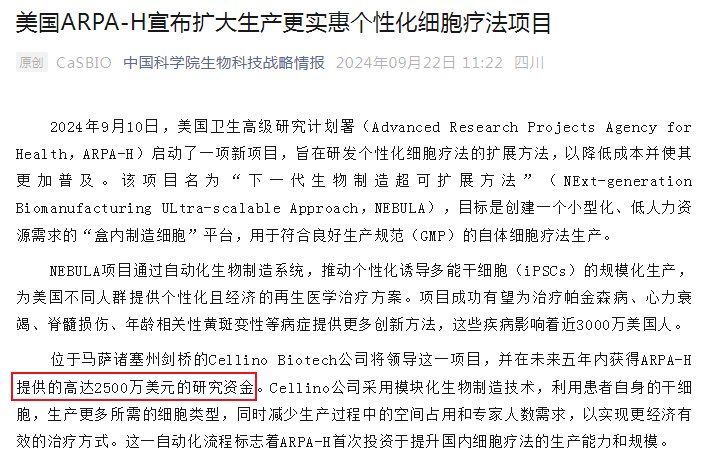
"Awakenings" is adapted from the memoir of the same name by neurologist Oliver Sacks. It tells the real case of his use of levodopa for patients with sleeping encephalitis in the 1960s and 1970s. This film, released in 1990, allows us to witness the hardships and hope of medical exploration, especially the helplessness and persistence in the face of nervous system diseases. In the film, doctor Malcolm Sale discovered a drug that might treat sleeping encephalitis in a mental hospital. Although the miracle was short-lived, it inspired our imagination of the infinite possibilities of medicine.
Nowadays, with the rapid development of technology, especially the rise of iPSC (Induced Pluripotent Stem Cell) cell therapy, we are standing at a new starting point, re-examining and challenging those once seemingly insurmountable medical problems. iPSC cell therapy is gradually turning this imagination into reality. iPSC technology can reprogram adult cells into pluripotent stem cells and then differentiate into various specific types of cells, providing unprecedented opportunities for treating a variety of stubborn diseases, including neurological diseases.
Recently, there has been a series of good news about the inflow of research funds from the iPSC cell therapy industry.
On September 14, Hangzhou Xingsai Ruizhen Biotechnology Co., Ltd.("Xingsai Ruizhen") announced that it had recently completed tens of millions of yuan in angel round financing to promote the research and development of iPSC organ transplant replacement products. Among them, CRG-101 pipeline is iPSC-derived corneal endothelial cell therapy, and CRG-002 is iPSC-derived islet cell therapy.

Previously, in January 2022, Cellino Biotech received a US$80 million Series A financing led by Leaps by Bayer, the influential investment arm of Bayer AG, with the goal of producing cells without human intervention.
September 14, Hangzhou Xingsairuizhen Biotechnology Co., Ltd., Ltd. announced that it has recently completed tens of millions of yuan in angel round financing to promote the research and development of iPSC organ transplant replacement products. Among them, CRG-101 pipeline is iPSC-derived corneal endothelial cell therapy, and CRG-002 is iPSC-derived islet cell therapy.
On September 20, GC Therapeutics announced the formal establishment and completion of a US$65 million Series A financing, which will be committed to promoting and unlocking the next generation of cell therapies. The company's induced pluripotent stem cell (iPSC) programming platform TFome (Transcription Factor Group), developed in the laboratory of Professor George Church at Harvard Medical School, brings together the latest advances in synthetic biology, gene editing, cell engineering, and machine learning to overcome the development and scaling complexities associated with cell therapies and improve patient access to treatment in multiple disease areas. The TFome platform aims to revolutionize cell therapies by delivering iPSC-based off-the-shelf cell therapies through a one-step process 100 times faster than traditional methods to increase efficacy, efficiency, quality and reduce costs. The company's initial pipeline will focus on gastrointestinal, neurological and immune diseases.
At the same time, domestic companies have also made significant progress in the field of iPSC cell therapy.
As a leader in this field, Zhongsheng Traceability continues to promote the research and development of multiple types of cell drug pipelines in the three major medical directions of anti-inflammatory repair, tumor immunity and regenerative medicine around the core technology of iPSC. Currently, three product pipelines have entered the registration clinical trial stage. iPSC-derived mesenchymal cell (iMSC) and iPSC-derived natural killer cell (iNK) therapeutic products are the first clinically approved iMSC and iNK cell drugs in China.
In January this year, Shize Biotech completed the transplantation of clinical-grade autologous iPSC-derived dopaminergic nerve precursor cell injection via minimally invasive surgery for the treatment of Parkinson's disease. This is the first clinical-grade iPS-derived cell transplantation in China for the treatment of Parkinson's disease. It is also the first case in China and the second case in the world for the replacement of autologous iPS-derived cells for the treatment of Parkinson's disease.
NouvNeu001 injection, a human dopaminergic precursor cell therapy product independently developed by Ruijian Pharmaceutical, is the world's first chemical induction-based universal cell therapy product in the field of Parkinson's treatment to enter the clinical stage of new drug registration.
Chengnuo Medical's ALF201 is the world's first clinically approved iPSC-derived cell candidate for the treatment of acute ischemic stroke and has entered the clinical trial stage.
Huode Bioengineering iPSC-derived pre-cerebral nerve precursor cell injection hNPC01 is the world's first pluripotent stem cell-derived pre-cerebral nerve precursor cell therapeutic product that has received FDA registration and clinical approval. According to published data, as of April 29, the project's registered clinical and clinical studies have completed dosing to 13 subjects 16 to 58 months after stroke, and a follow-up period of up to nearly 5 months. The health status of all subjects is stable.
Conclusion
iPSC cell therapy has particular potential in treating nervous system diseases. Nervous system diseases such as Parkinson's disease, Alzheimer's disease, and multiple sclerosis have long been a problem in the medical community. iPSC technology can repair damaged neural tissue and restore patient's neurological function by differentiating into neurons or glial cells. In addition, the application of iPSC cell therapy in diabetes, heart failure, age-related macular degeneration, gastrointestinal and immune diseases also shows broad prospects.
From the medical exploration in "Speechless Ask the Sky" to the vigorous development of iPSC cell therapy today, we have witnessed the rapid advancement of medical technology and the continuous emergence of miracles of life. With its unique advantages, iPSC technology is gradually changing our understanding of disease treatment and bringing new hope to countless patients. In the future, as technology continues to mature and applications continue to expand, we have reason to believe that iPSC regenerative medicine will open a new era of treatment, making the tree of life more luxuriant and allowing every life to bloom the most dazzling light.